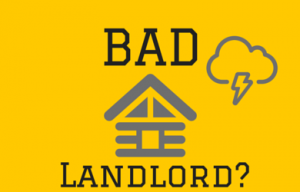 It is hard to be a tenant in Florida with an unpleasant landlord. Typical complaints can include broken appliances, leaking, the mold that is inevitable when you have leaking and air conditioning, a refusal to return your security deposit, and the list goes on and on. Here are some tips for dealing with your landlord to preserve your rights, set your attorney up to win a case on your behalf, and live peacefully in your rented home.
It is hard to be a tenant in Florida with an unpleasant landlord. Typical complaints can include broken appliances, leaking, the mold that is inevitable when you have leaking and air conditioning, a refusal to return your security deposit, and the list goes on and on. Here are some tips for dealing with your landlord to preserve your rights, set your attorney up to win a case on your behalf, and live peacefully in your rented home.
Find out what your rights and responsibilities are as a tenant.
-
Read your lease agreement
Your lease agreement is an enforceable contract with your landlord. It lays out your rights and responsibilities for the home in exchange for your rent payments. In general, your lease will describe the property you are leasing, the length of time of your lease, or “term,” the amount of rent payments, the security deposit, whether you are allowed pets, and perhaps other subjects. The Florida Supreme Court provides a lease form.
When a problem occurs in your home that you think is the landlord’s responsibility, like a repair, first check the lease to learn who is responsible for handling the problem. Also, check to make sure that you are in compliance with your lease. Remember the old saying, “he who lives in a glass house should not throw stones.” You need to be sure to fulfill your responsibilities as a tenant so that you can throw stones without reservation. That means if your lease doesn’t allow pets, don’t have a pet. If you aren’t allowed to smoke in your home under the lease, don’t smoke in your home. Don’t throw wild parties and don’t have unauthorized guests. Take good care of your rented home and obey the law. If you are not holding up your end of the bargain, it will be difficult, if not impossible, to make the landlord hold up its side.
-
Read Florida Statute Title VI, Chapter 83, Part II for Residential Tenancies
If you don’t have a lease agreement with your landlord, or you think your lease is unfair, check the Florida Statute. Florida Statute Section 83.47 will not enforce a provision in a rental agreement that “purports to waive or preclude the rights, remedies, or requirements set forth in this part,” or “purports to limit or preclude any liability of the landlord to the tenant or of the tenant to the landlord, arising under law.” Section 83.45 states that, “if the court as a matter of law finds a rental agreement or any provision of a rental agreement to have been unconscionable at the time it was made, the court may refuse to enforce the rental agreement, enforce the remainder of the rental agreement without the unconscionable provision, or so limit the application of any unconscionable provision as to avoid any unconscionable result.” In other words, if your lease agreement is found by the court to be unfair or inconsistent with the law, then the court will strike the provision of the agreement that is unfair or even the whole agreement in your favor.
Section 83.51 of the statute makes landlords responsible for “comply[ing] with the requirements of applicable building, housing, and health codes,” or if there are none, then they must maintain “the roofs, windows, doors, floors, steps, porches, exterior walls, foundations, and all other structural components in good repair and capable of resisting normal forces and loads and the plumbing in reasonable working condition.” The landlord also has to provide locks and keys, the clean and safe condition of common areas, garbage removal, functioning facilities for heat during winter, running water, hot water, and smoke detection. In addition, landlords are responsible for maintaining screens and exterminating pests like “rats, mice, roaches, ants, wood-destroying organisms, and bedbugs.” If your problem is pests, the landlord cannot make you vacate the home for more than four days, and must give you written notice seven days in advance. They also have to “abate” or reduce your rent for the time you had to leave the home. Other than that, they do not owe you for damages.
Even if your lease did not give you more responsibility than paying rent, you have obligations towards your landlord under the statute. Just like the landlord, the tenant must “comply with all obligations imposed upon tenants by applicable provisions of building, housing, and health codes.” Tenants must “keep that part of the premises which he or she occupies and uses clean and sanitary, remove from the tenant’s dwelling unit all garbage in a clean and sanitary manner, keep all plumbing fixtures in the dwelling unit or used by the tenant clean and sanitary and in repair, use and operate in a reasonable manner all electrical, plumbing, sanitary, heating, ventilating, air-conditioning and other facilities and appliances, including elevators, not destroy, deface, damage, impair, or remove any part of the premises or property therein belonging to the landlord nor permit any person to do so, and conduct himself or herself, and require other persons on the premises with his or her consent to conduct themselves, in a manner that does not unreasonably disturb the tenant’s neighbors or constitute a breach of the peace.”
Once you have learned your rights and responsibilities, make your complaints in writing
Tenants often fail to enforce their rights because they do not provide the correct form of notice to the landlord. Telephone calls and emails to complain are not enough. The law requires you to notify the designated agent of the landlord, at their designated address, (see Section 83.50) with an old-fashioned letter on paper that must be sent by mail or hand delivered. (See Section 83.20[3]) I recommend certified mail, but you can probably skip the return-receipt. (Sometimes people will refuse to sign or not be available to sign, so requiring signatures can interfere with giving them proper notice.)
Under Section 83.201, if a repair is the landlord’s responsibility, the tenant must serve “a written notice declaring the premises to be wholly untenantable, giving the landlord at least 20 days to make the specifically described repair or maintenance, and stating that the tenant will withhold the rent for the next rental period and thereafter until the repair or maintenance has been performed.” Check your lease to make sure that there is not a longer period of time allowed for the repair. When the landlord completes the repair, the tenant must pay the amount of rent withheld.
If the landlord does not complete the repair or maintenance in the allotted time, the landlord and tenant may agree to extend the time in writing, or the tenant may abandon the premises, retain the amounts of rent withheld, terminate the lease, and avoid any liability for future rent or charges under the lease with written notice provided at least seven days before leaving. The Pinellas County Clerk of Court’s office has provided tenants this form.
When you decide to withhold rent, you may receive a seven-day notice of curable noncompliance or a three-day notice to pay or vacate. like this. You should respond to either of these with a written letter saying that you are happy to comply or pay when the landlord fixes the issue you have. You could also send your landlord notice that you will leave in seven days with a Seven Day Notice of Curable Noncompliance. If you do not pay or vacate, the next thing you would likely receive is a Complaint for Eviction.
You must respond to the complaint for eviction with your defenses within five days or you will lose your case by default. The response has to be filed with the clerk of court of your county and mailed to your landlord. Once you receive your complaint for eviction and responded (within five days) the court will schedule a pretrial conference. In Miami-Dade County, the pretrial conference will include a mediation. In a mediation, the parties meet with each other and their attorneys with a neutral mediator to discuss their differences and try to resolve their problem. If you cannot agree, the mediator will file a notice of impasse, which tells the court that you could not agree and will go on to have a trial. Before trial, you must comply with the judge’s requirements and provide any evidence you intend to bring up in the trial to the other side. Some judges will require a pretrial memorandum or catalog, which is a summary of your arguments, evidence and the law and cases you will be citing. The judge will describe what is required in a trial order. Read this carefully and be sure to comply.
On the day of trial, you will have to bring all of your documents and witnesses and then try the case.
Before you start a war with your landlord, be sure to consider whether the cost outweighs the benefit. Do you really want to have a lawsuit that could last a year and upset the peace of your living situation? Is it worth the risk of losing your case and having to pay all of your landlord’s attorney’s fees? What do you have to gain? Secondly, I would not recommend going through with this process or a trial without a lawyer. If you cannot afford a lawyer, be sure to check local legal aid societies and law school clinics to see if you can obtain a pro bono attorney to help you. It is almost always preferable to have an attorney to represent you, especially if your landlord has an attorney, because they will know the law and procedures to be able to defend you effectively. When you win a landlord-tenant lawsuit, you may win your attorney’s fees as well. (See 83.625) This means when you lose a landlord-tenant lawsuit, you could have to pay your landlord’s attorney’s fees and costs.
For additional information and to learn more I have provided the links below:
Landlord/ Tenant Forms & Instructions
Landlord Rights & Frequently Asked Questions
Florida Department of Agriculture and Consumer Services
Other articles:
- What You Need to Know: Threats Your Technology Poses to Confidentiality and Attorney-Client Privilege
- How to deal with a bad tenant

